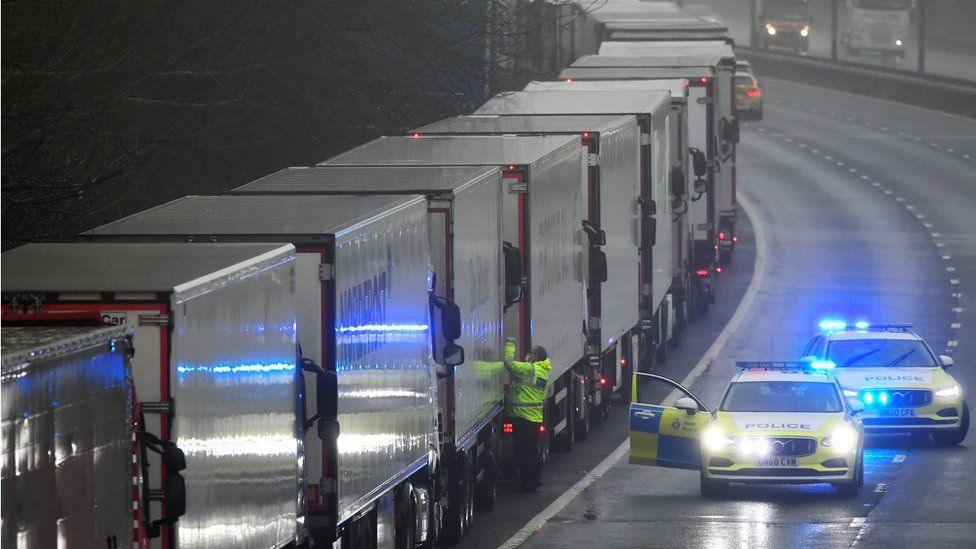Scottish seafood exports 'held up by post-Brexit rules'
- Published

Seafood exporters have claimed post-Brexit customs arrangements are causing delays as "entire trailers" need to be checked rather than samples.
The Scottish Seafood Association says exports to the EU are being hit by "red tape" delays in Scotland and France.
It claims up to 25 trucks were backlogged for clearance due to computer problems in Boulogne on Tuesday.
Delays have also affected distribution at three depots in Lanarkshire.
The UK government said it was aware of "a small number of issues...due to some information not being entered correctly into UK and French systems".
The Scottish Seafood Association has warned the problem is likely to get worse in the coming days as the pace of trade increases.
Delays in Scotland are due to the time it takes to get an Export Health Certificate for both wild-caught fish and farmed salmon.
This is a newly-required stipulation following the UK's exit from the European Customs Union last week.
Vets are required to sign off each consignment and it is claimed they are taking up to six times longer than expected to do so.
Some fishing and seafood companies have complained that the export arrangements are a "shambles".
'Worrying sign'
Jimmy Buchan, chief executive of the Scottish Seafood Association, said: "Trucks laden with fresh seafood are being held up in central Scotland due to problems with customs barcodes and lack of veterinary service capacity.
"Instead of representative samples being removed from trucks and checked, entire trailers are being emptied so that every box and label can be checked.
"Combined with computer problems on both sides of the English Channel, this is a worrying sign for the days and weeks ahead when the flow of produce will get much greater."
He added: "Ministers of both the UK and Scottish governments need to get on top of the situation and resolve these issues as soon as possible."

Tonnes of Scottish seafood destined for continental European markets were stuck at Dover when the border with France was closed in December
The association has previously warned that perishable seafood could go to waste if it was stuck in transit.
It followed the closure of the border to France in December due to the new coronavirus strain emerging in the UK.
New rules around trade between the UK and EU came into force following the end of the Brexit transition period on 31 December.
While little disruption was reported in the early days of the new arrangements, the volume of cross-border trade is expected to increase.
'Keep goods moving'
A UK government spokeswoman said: "We are aware of a small number of issues relating to the movement of fish and seafood due to some information not being entered correctly into UK and French systems.
"Both the UK and French systems are working. We are contacting exporters, their representatives and transporters to help them understand the requirements and we will work closely with them to keep their goods moving.
"It is vital that exporters check they have entered in details correctly and ensure that they have provided the transporter of the goods with the correct documentation."
The Scottish government said it was working to provide an EHC (Export Health Certificate) service at a number of central Scotland logistics hubs.
Rural Economy Secretary Fergus Ewing said: "We are all learning - including businesses - how to manage the considerable burden of this new bureaucracy on exporting food products.
"We know how frustrating, time consuming and indeed costly this is for Scottish businesses - we warned the UK government that we needed much more clarity much sooner than we got on what the export process would involve.
"It is far better for problems to be identified and resolved here in Scotland and not have consignments being turned back hundreds of miles away or refused when they arrive at the end of their journey."